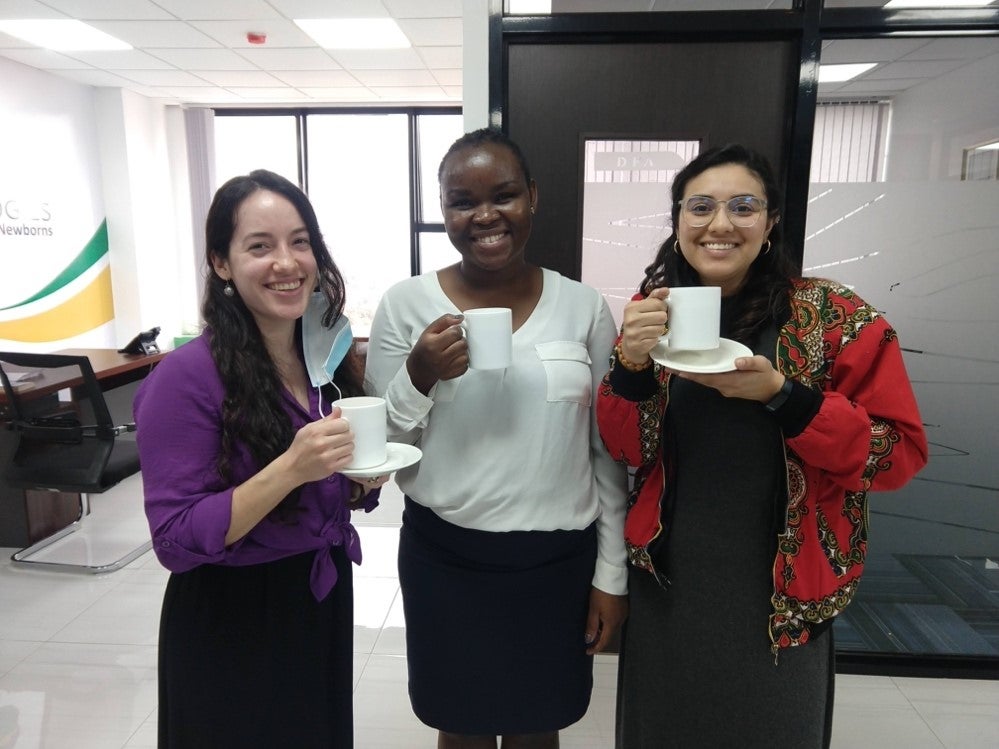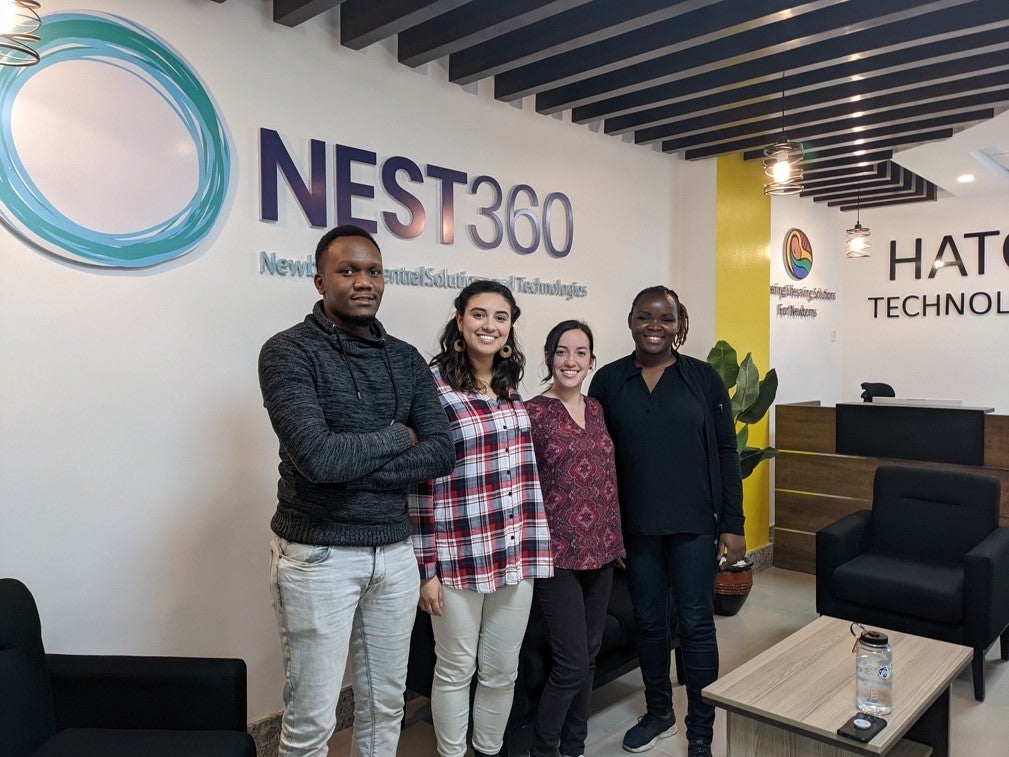Rice360 Institute for Global Health Technologies offers post-baccalaureate fellowships for exceptional early-career engineers with an interest in medical technology for low-resource settings. The Rice360 fellows work closely with our international teams and often travel to support the development of Rice360-supported projects.
Recently, Rice360 fellow, Natalie Mitchell, traveled to Kenya to work with our colleagues at Nairobi to begin a clinical study on Celsi Monitor, a low-cost portable device used to continuously monitor a newborn’s body temperature. The following is her account of her time in Keny
When I started my fellowship in 2021, Celsi Monitor was a fully working prototype that had been proven to work in a laboratory setting. The goal of our study in Kenya was to determine how well it works in the intended setting, a hospital in a low-resource setting.
Celsi Monitor helps hospital staff continuously monitor an infant’s body temperature to ensure the baby does not experience hypothermia or hyperthermia (being too cold or too hot) and alerts hospital staff if intervention is needed. Because hypo- and hyperthermia can lead to severe complications, devices like Celsi Monitor can improve outcomes for newborns.
My journey through global health
The work around Celsi Monitor led me to reflect on my journey through global health. My first exposure to global health was a wheelchair research project in Kenya during my freshman and sophomore years at LeTourneau University. During this study, we tested wheelchairs designed for low-resource settings. I enjoyed being able to work with the children who used wheelchairs and learned how design choices can support their mobility within their communities.
Following that, I led a team in designing a portable surgical table used in rapidly established field hospitals to provide medical care following disasters or in areas without access to a hospital for Samaritan’s Purse.
Rice360 Global Health Fellowship
The Rice360 Global Health Fellowship aligned with my interest in developing systems to provide care in all settings. During my undergraduate studies, I did lab and field testing, but the background setup had already been completed when I joined those projects.
The Fellowship afforded me the great opportunity to coordinate with our partners in Kenya to establish the first Rice360 device study in Kenya from scratch. My work included learning how to start an ethical study with human participants from the ground up.
Celsi Monitor in-hospital study

During my first year of this Fellowship, our team worked hard to set up the Celsi Monitor study that would compare the Celsi Monitor to a gold standard patient vitals sign monitor by monitoring infants at Kenyatta National Hospital. Together with our partners in Kenya, we determined the best methods for collecting data and meeting ethical standards.
Designing a new study included submitting applications to Institutional Review Boards (IRBs), the official organizations that review, monitor, and approve research at an institutional level. Ultimately, we our gained ethical approval from IRBs at both Rice University and our partner site, Kenyatta National Hospital. We were on our way to collecting important data!
The study also required me to develop training modules to show study personnel how to collect data using the study equipment. In addition, I planned the study’s logistics and documented our work.
After a year of meeting only virtually to design the study and work on the ethical approval processes, I was finally able to visit Kenya. It was a highlight of our visit to meet our teammates in person and have tea with them!

The value of teamwork
The Rice360 team included Sonia Sosa, Clinical Research Engineer, and me from Rice360 in Houston. Our NEST360 Kenya colleagues, Ekran Rashid, Helen Bokea, and George Okello were very welcoming and excited to help us start the study.
Early during our visit, we transported our equipment and supplies to the study site at Kenyatta National Hospital. While we were there, we got to meet with the study's principal investigators, Dr. Mary Waiyego, a neonatologist, and Dr. Grace Irimu, a pediatrician and researcher.

Our team also includes Lewis Kamindu, a biomedical engineer, and Melanie Abongo, a nurse. Their professionalism and experience helped this study start smoothly. We all worked well, and tirelessly, over the two-week visit to Kenya. Besides delivering equipment, we worked together to refine our approaches to data collection during face-to-face conversations, set up our study office, and prepared for the first data collection runs.

Melanie and Lewis provided insight and proactively proposed ideas for data collection setup. For example, Lewis adapted the cart we used for moving our data collection equipment to fit the vital signs monitor cable. During the two weeks, we were there, we used a newborn doll filled with warm water to practice data collection. After we left and took the doll with us, Melanie got creative and used a water bottle to simulate a warm baby so she and Lewis could continue to practice using Celsi Monitor before collecting data with real babies.
Even with setbacks along the way, such as delays due to hospital restrictions, our team did not stop. We continued to work together as an international team to keep the data collection process going. After months of prep work, we began gathering in the data needed to understand how Celsi Monitor works in a real-world setting. Celsi Monitor will address a gap in newborn temperature monitoring in low-resource settings; I am excited to see the day the device goes to market.
The time and effort have been worth it, and I am proud to have worked with such a strong team to develop a sustainable project with our international partners.
The project continues to move forward
Our team accomplished all goals set for our time in Kenya! Since Sonia and I returned home, the local team has continued collecting data. We communicate with them regularly to support them with data collection, data entry, and data analysis.
Currently, I am compiling documentation and lessons learned for future Fellows and Rice360. My work will inform two more Rice360 studies in 2023, where we will collaborate with NEST360 in Nigeria and Tanzania.
Exploring Kenya
It was great to travel to Kenya with Rice360. My first trip to Kenya took me to a rural area; this time I was able to experience the capital city, Nairobi. For fun, Sonia and I got to go on a safari! Our driver, James, told us a lot about Nairobi on the way to Nairobi National Park and shared a lot of facts about the animals. We also visited a workshop called Kobe Tough, an organization for women in need who make clay jewelry. We toured their workshop and learned how they get the clay and process it for their products. Another fun activity was our visit to the Nairobi National Museum, where we learned more about Kenya’s culture and history.

This last year with Rice360 has included some of the most rewarding and complex work I have done so far in my career. Even more important to me are the professional relationships I have been able to build through this program. We have worked hard together and tackled obstacles toward our shared goal of improving newborn care worldwide.

